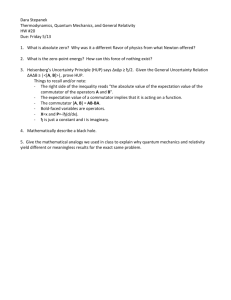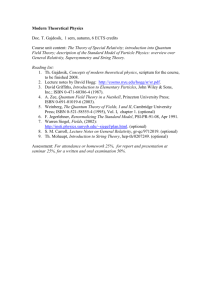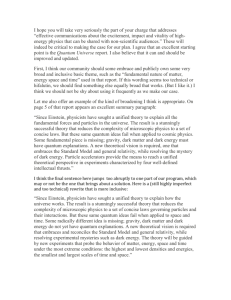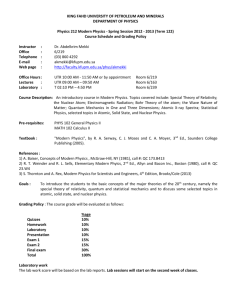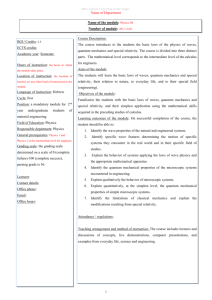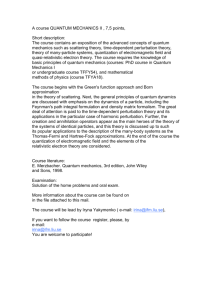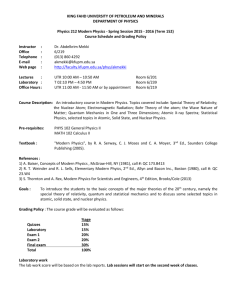Space-time ontology after general relativity
advertisement
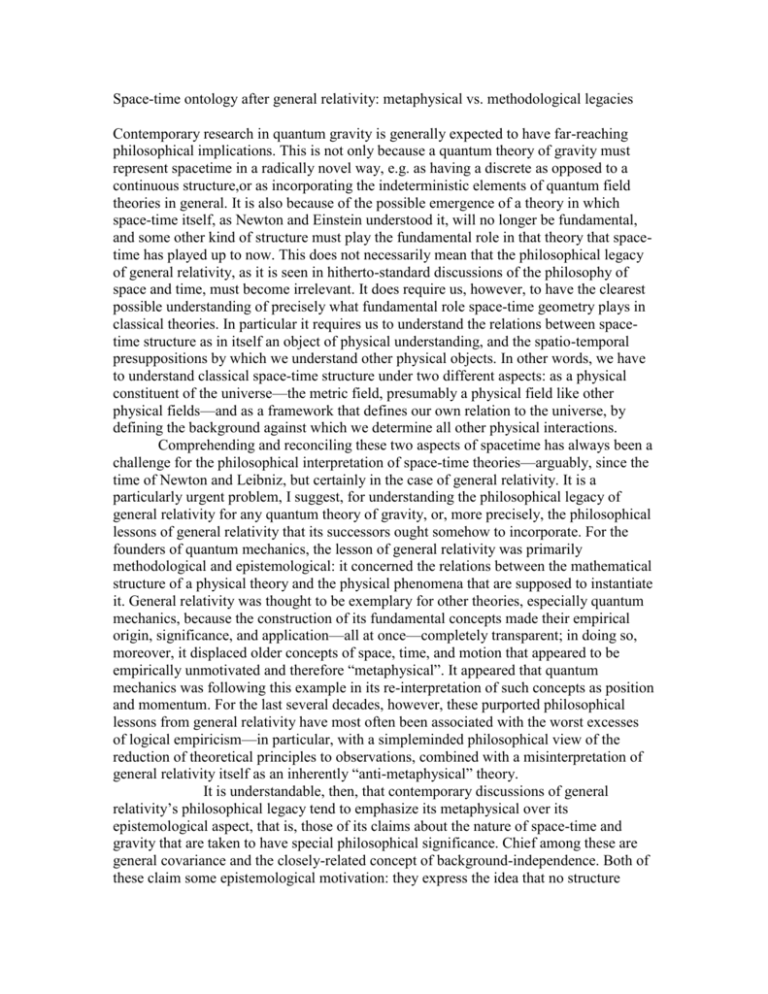
Space-time ontology after general relativity: metaphysical vs. methodological legacies Contemporary research in quantum gravity is generally expected to have far-reaching philosophical implications. This is not only because a quantum theory of gravity must represent spacetime in a radically novel way, e.g. as having a discrete as opposed to a continuous structure,or as incorporating the indeterministic elements of quantum field theories in general. It is also because of the possible emergence of a theory in which space-time itself, as Newton and Einstein understood it, will no longer be fundamental, and some other kind of structure must play the fundamental role in that theory that spacetime has played up to now. This does not necessarily mean that the philosophical legacy of general relativity, as it is seen in hitherto-standard discussions of the philosophy of space and time, must become irrelevant. It does require us, however, to have the clearest possible understanding of precisely what fundamental role space-time geometry plays in classical theories. In particular it requires us to understand the relations between spacetime structure as in itself an object of physical understanding, and the spatio-temporal presuppositions by which we understand other physical objects. In other words, we have to understand classical space-time structure under two different aspects: as a physical constituent of the universe—the metric field, presumably a physical field like other physical fields—and as a framework that defines our own relation to the universe, by defining the background against which we determine all other physical interactions. Comprehending and reconciling these two aspects of spacetime has always been a challenge for the philosophical interpretation of space-time theories—arguably, since the time of Newton and Leibniz, but certainly in the case of general relativity. It is a particularly urgent problem, I suggest, for understanding the philosophical legacy of general relativity for any quantum theory of gravity, or, more precisely, the philosophical lessons of general relativity that its successors ought somehow to incorporate. For the founders of quantum mechanics, the lesson of general relativity was primarily methodological and epistemological: it concerned the relations between the mathematical structure of a physical theory and the physical phenomena that are supposed to instantiate it. General relativity was thought to be exemplary for other theories, especially quantum mechanics, because the construction of its fundamental concepts made their empirical origin, significance, and application—all at once—completely transparent; in doing so, moreover, it displaced older concepts of space, time, and motion that appeared to be empirically unmotivated and therefore “metaphysical”. It appeared that quantum mechanics was following this example in its re-interpretation of such concepts as position and momentum. For the last several decades, however, these purported philosophical lessons from general relativity have most often been associated with the worst excesses of logical empiricism—in particular, with a simpleminded philosophical view of the reduction of theoretical principles to observations, combined with a misinterpretation of general relativity itself as an inherently “anti-metaphysical” theory. It is understandable, then, that contemporary discussions of general relativity’s philosophical legacy tend to emphasize its metaphysical over its epistemological aspect, that is, those of its claims about the nature of space-time and gravity that are taken to have special philosophical significance. Chief among these are general covariance and the closely-related concept of background-independence. Both of these claim some epistemological motivation: they express the idea that no structure should be attributed to space-time “a priori,” and that all geometrical structure should emerge from existing physical conditions. But by the same token they recommend or discourage particular metaphysical pictures of the relation between space-time and matter fields, and so they lead to assertions about the physical world that, ultimately, ought to be judged on empirical rather than on philosophical grounds. My aim is to revisit the kind of epistemological and methodological arguments that led to special and general relativity, and thereby to reconsider the role of conceptual analysis in the foundations of space-time theories. I suggest that, despite the failure of the logical positivists to comprehend them clearly, such philosophical analyses of fundamental concepts had an essential constructive role to play in both relativity and quantum theory. More important, they can help us to understand the relation between the interpretive problems of quantum mechanics and the interpretive problems of space-time theories, in a way that may ultimately be illuminating for the problems of quantum gravity. Toward that end, I will consider how Einstein’s notion of a “principle theory” may apply, respectively, to the cases of relativity and quantum mechanics. From the general definition of a principle theory— that it expresses “general characteristics of natural processes, principles that give rise to mathematically formulated criteria which the separate processes or the theoretical representations of them have to satisfy”—it is not obvious how the uniqueness of a particular set of criteria could be defended. But from Einstein’s application of this idea in the development of special and general relativity, it is possible to see how such criteria can arise from a critical analysis of fundamental concepts, and the ways in they function in a given theory. Einstein did not merely choose to elevate the invariance of light to the status of a fundamental postulate; he found, rather, that the light principle was in fact playing the role of a criterion for the analysis of other material processes. If there is an analogous principle for quantum mechanics, there must be an analogous argument that certain quantum-mechanical principles play an analogous role as criteria—as conditions of the possibility of subjecting quantum phenomena to mathematical law. I consider, from this perspective, some recent proposals concerning “what quantum mechanics is about.” From these historical and systematic considerations, I suggest, we can at least understand what we ought to ask of any interpretation of quantum mechanics that aspires to express its essential physical content. In doing so we can expect to get some insight into the philosophical connections of relativity, quantum mechanics, and the eventual synthesis of the two. Robert DiSalle Department of Philosophy University of Western Ontario London, Ontario N6A 3K7 Canada
